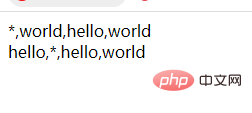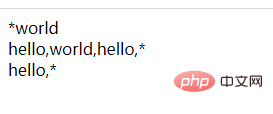PHP中提供了多个可以进行字符串替换的函数,但它们进行替换的方式是不一样的。有些是直接给出需要替换的子串,有些就是给出替换开始的位置,和替换长度。今天我们就来了解后一种方法。
我们来看看下面一个例子:
<?php $str = 'hello,world,hello,world'; $replace = '*'; echo substr_replace($str, $replace, 0,5)."<br>"; echo substr_replace($str, $replace, 6,5)."<br>"; ?>
看这个代码,你们觉得会输出什么?是不是应该输出“*,world,hello,world”和“hello,*,hello,world”,那对不对呢,我们来看看输出结果:

是的,没错。在上例中,substr_replace()函数分别将字符串$str从第一个字符开始,有5个字符长度的子串“hello”和从第7个字符开始,有5个字符长度的子串“world”替换成了*号。
好了,了解了如何将某长度的子串换成*号,下面我们来了解一下实现这个功能的函数substr_replace()。
substr_replace($string,$replacement,$start,$length)函数接受了三个必需参数$string、$replacement(替换值)和$start(替换开始的位置),一个可省略的参数$length(要替换的字符数目)。
substr_replace()函数可以在字符串 $string 的副本中将由 $start 和 $length 参数限定的子字符串使用 $replacement 进行替换。
简单来说,就是使用$replacement值从$start位置开始(注,字符串位置起始于 0),替换$length数目的字符。
$start有三种取值情况:
为正数,替换将从 $string 的 $start 位置开始。
为0 ,替换将从 $string 的第一个字符处开始
为负数,替换将从 $string 的倒数第 $start 个位置开始。
$length 参数有四种取值情况:
为正数,就表示被替换的子字符串的长度。
为负数,就表示待替换的子字符串结尾处距离 $string 末端的字符个数。
为 0,那么substr_replace()函数就有了插入功能,会将
$replacement插入$start位置处。如果省略此参数,那么默认为 strlen(string)(字符串的长度),即替换从 $start 位置开始的整个子字符串。
<?php $str = 'hello,world,hello,world'; $replace = '*'; echo substr_replace($str, $replace, 0,-5)."<br>"; echo substr_replace($str, $replace, -5,5)."<br>"; echo substr_replace($str, $replace, 6)."<br>"; ?>
输出结果:

好了就说到这里了,有其他想知道的,可以点击这个哦。→ →php视频教程
最后给大家
